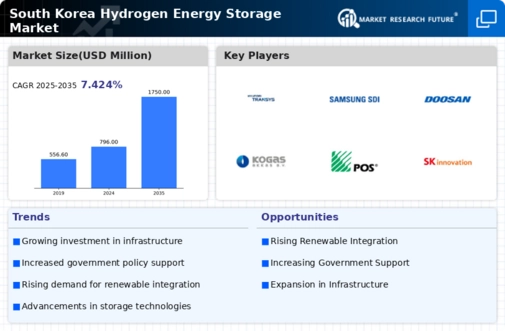Rising Energy Demand
The increasing energy demand in South Korea is a crucial driver for the hydrogen energy-storage market. As the nation continues to industrialize and urbanize, energy consumption is projected to rise significantly. The government anticipates that energy demand could increase by approximately 30% by 2030. This growing need for energy storage solutions creates a favorable environment for hydrogen technologies, which can provide reliable and scalable energy storage options. The hydrogen energy-storage market is likely to benefit from this trend, as hydrogen can serve as a versatile energy carrier, helping to balance supply and demand in the energy grid. Furthermore, the integration of hydrogen storage systems can enhance energy security and reduce reliance on fossil fuels, aligning with South Korea's long-term energy strategy.
Technological Innovation
Technological innovation plays a vital role in shaping the hydrogen energy-storage market in South Korea. Recent advancements in electrolysis and fuel cell technologies have improved the efficiency and cost-effectiveness of hydrogen production and storage. For instance, the efficiency of electrolysis systems has increased to over 70%, making hydrogen a more attractive option for energy storage. The hydrogen energy-storage market is expected to benefit from these innovations, as they enhance the feasibility of hydrogen solutions in various applications. Furthermore, ongoing research and development efforts are likely to yield new technologies that could further reduce costs and improve performance, thereby driving market growth.
Environmental Regulations
Stringent environmental regulations in South Korea are propelling the hydrogen energy-storage market forward. The government has implemented various policies aimed at reducing greenhouse gas emissions, with a target to cut emissions by 37% by 2030 compared to 2005 levels. These regulations create a pressing need for cleaner energy solutions, positioning hydrogen as a viable alternative. The hydrogen energy-storage market is likely to thrive under these conditions, as hydrogen can significantly lower carbon footprints in energy production and consumption. Moreover, compliance with environmental standards may drive industries to invest in hydrogen technologies, thereby expanding the market and fostering innovation.
Investment in Infrastructure
Investment in infrastructure is a pivotal factor driving the hydrogen energy-storage market in South Korea. The government has committed to investing over $2 billion in hydrogen infrastructure by 2025, which includes the development of hydrogen refueling stations and storage facilities. This substantial financial commitment indicates a strong belief in the potential of hydrogen technologies. The hydrogen energy-storage market stands to gain from this investment, as improved infrastructure will facilitate the adoption of hydrogen solutions across various sectors, including transportation and power generation. Additionally, the establishment of a robust hydrogen infrastructure can stimulate private sector investments, further accelerating market growth and innovation.
Public Awareness and Acceptance
Public awareness and acceptance of hydrogen technologies are emerging as significant drivers for the hydrogen energy-storage market in South Korea. As educational campaigns and media coverage increase, more citizens are becoming informed about the benefits of hydrogen as a clean energy source. Surveys indicate that approximately 60% of the population supports the transition to hydrogen energy solutions. This growing acceptance can lead to higher demand for hydrogen energy-storage systems, as consumers and businesses seek sustainable alternatives. The hydrogen energy-storage market is poised to capitalize on this trend, as increased public support may encourage policymakers to implement favorable regulations and incentives, further stimulating market growth.



















Leave a Comment